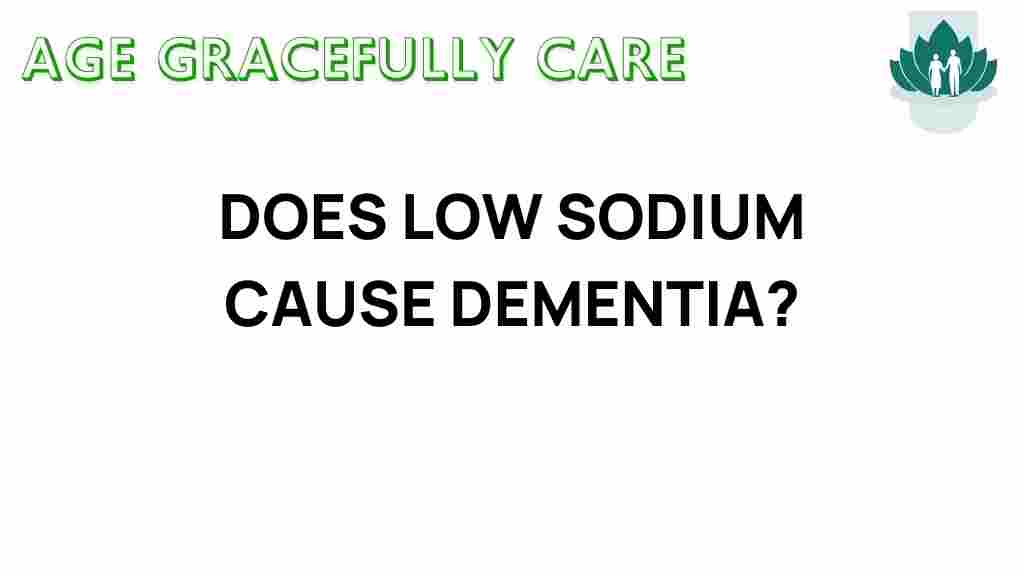Unraveling the Mystery: Does Low Sodium Contribute to Dementia?
The relationship between sodium intake and health has long been a subject of debate among nutritionists and health professionals. While excessive sodium is widely recognized as a contributor to high blood pressure and cardiovascular issues, the implications of low sodium intake are less clear, particularly concerning brain health and dementia. In this article, we will explore the potential links between low sodium, dementia, and cognitive decline, offering insights into dietary guidelines and their impact on mental clarity.
Understanding Sodium’s Role in the Body
Sodium is an essential mineral that plays a vital role in various bodily functions, including:
- Maintaining fluid balance
- Supporting nerve function
- Regulating muscle contractions
However, the body requires sodium in moderation. The recommended daily sodium intake varies, but it is generally advised to consume no more than 2,300 mg per day for most adults. This recommendation is often based on the need to avoid the health risks associated with excessive sodium.
The Link Between Sodium Intake and Cognitive Health
Emerging research suggests that sodium intake may influence cognitive health in both directions—too much sodium can be harmful, but too little may also pose risks. Here’s how low sodium may contribute to cognitive decline:
- Fluid Balance: Low sodium levels can lead to dehydration, which negatively impacts cognitive function and can worsen symptoms of dementia.
- Nerve Function: Sodium is crucial for proper nerve signaling. Insufficient sodium may lead to decreased brain function and impaired communication between neurons.
- Blood Pressure Regulation: Low sodium diets can sometimes lead to hypotension (low blood pressure), which can reduce blood flow to the brain, potentially contributing to cognitive decline.
Understanding Dementia and Its Risk Factors
Dementia is an umbrella term for a range of cognitive impairments that affect daily living. It encompasses various types, with Alzheimer’s disease being the most prevalent. Factors contributing to dementia include:
- Age
- Genetics
- Cardiovascular health
- Nutritional status
Research indicates that nutrition plays a significant role in brain health. Diets high in antioxidants, healthy fats, and essential nutrients can support cognitive function, while poor nutrition can accelerate cognitive decline.
Exploring the Research: Low Sodium and Dementia
Several studies have investigated the relationship between sodium intake and dementia risk. Here are key findings:
- A study published in the Journal of Alzheimer’s Disease found that low sodium intake was associated with an increased risk of cognitive decline in older adults.
- Another research indicated that individuals with low sodium levels had higher rates of cognitive impairment compared to those with moderate sodium intake.
These studies suggest that while high sodium intake poses health risks, low sodium may also negatively impact brain health, potentially leading to dementia.
Dietary Guidelines for Sodium Intake
To maintain optimal brain health and prevent cognitive decline, consider the following dietary guidelines regarding sodium intake:
- Aim for Balance: Strive for a balanced sodium intake of around 1,500 to 2,300 mg per day, adjusting based on individual health needs.
- Focus on Whole Foods: Prioritize whole, unprocessed foods, which naturally contain lower sodium levels and higher nutritional value.
- Stay Hydrated: Ensure adequate hydration, especially if following a low sodium diet, as dehydration can impact cognitive function.
Step-by-Step Approach to Adjusting Sodium Intake
If you’re considering adjusting your sodium intake for better brain health, follow this step-by-step approach:
- Assess Your Current Intake: Keep a food diary for a week to monitor your sodium consumption.
- Consult a Healthcare Professional: Discuss your findings with a nutritionist or doctor to determine your ideal sodium intake based on your health status.
- Make Gradual Changes: Slowly reduce sodium intake by replacing high-sodium foods with lower-sodium options.
- Increase Nutrient-Rich Foods: Incorporate more fruits, vegetables, whole grains, and lean proteins into your diet.
- Monitor Your Health: Regularly check in with your healthcare provider to evaluate how changes in sodium intake are affecting your overall health and cognitive function.
Troubleshooting Common Issues
Adjusting sodium intake can present challenges. Here are some common issues and tips to troubleshoot them:
- Feeling Tired or Weak: If you experience fatigue, ensure you’re consuming enough electrolytes and hydrating adequately.
- Cognitive Symptoms: If you notice cognitive issues after reducing sodium, consult a healthcare provider, as you may need to adjust your intake.
- Cravings for Salty Foods: Satisfy cravings with natural flavor enhancers such as herbs and spices, which can make meals enjoyable without adding sodium.
Conclusion: Finding the Right Balance for Brain Health
Understanding the delicate balance of sodium intake is crucial for maintaining brain health and preventing dementia. While high sodium levels are a known health risk, low sodium intake may also contribute to cognitive decline. By following dietary guidelines, focusing on nutrition, and being mindful of sodium consumption, individuals can support their brain health and promote mental clarity as they age.
As research continues to evolve, staying informed about the relationship between sodium and dementia is essential. For more information on nutrition and brain health, consider visiting the National Institute on Aging.
In conclusion, taking proactive steps towards a balanced sodium intake can significantly impact cognitive health, reducing the risk of dementia and enhancing overall well-being.
This article is in the category Health and created by AgeGracefullyCare Team
